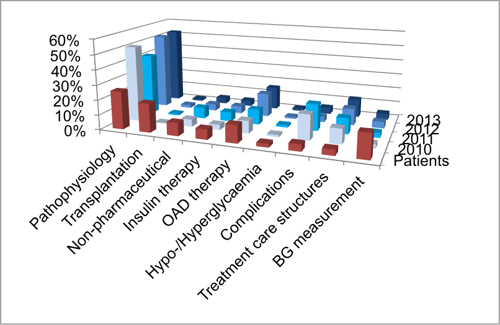Background and current status
Patient involvement in clinical research
These days patients are getting a more active role in health care systems. A British Medical Journal article stated public involvement in research should be “second nature” by 2025 [1]. Since 2006 the National Institute for Health Research (NIHR) has been supporting the initiative “INVOLVE” [2] aiming at involving the public and patients to improve health research in the UK. The strategic goals of “INVOLVE” include ensuring that opportunities to engage with research are made visible to the public and seized; that the public’s contribution is valued and required as part of high quality research; and that evidence of what works is collected and disseminated.The US Food and Drug Administration (FDA) has enacted programs that are focused on including patient perspectives throughout the continuum of medical product development [3].
Patient advocacy groups also claim that their opinions must have greater influence on the decisions that affect them, which is reflected in the phrase “nothing about me without me” [4]. The goal of “PatientPartner” [5], a 3-year project (until 2011) funded by the EU within the Seventh Framework Programme, was to include patient organizations as equal partners in all stages of clinical studies, thus leading to betterresearch individually tailored to patients’ needs. The recommendations from “PatientPartner” related to the creation of training activities for patient advocates have been embedded in the pan-European project “EUPATI”, the European Patients’ Academy on Therapeutic Innovation [6].
Patient engagement in clinical research - how and when? [4]
Already before the study takes place patients could be involved in the identification of research priorities, the study design and outcomes to be assessed. As a consequence, more relevant results and better recruitment and retention could be achieved. Patient organizations should receive information about ongoing studies from international trial registries, databases and platforms, which could improve access to clinical trials.
During the study patients should receive adequate information (e.g. understandable Informed Consent Documents and Patient Information Sheets). After the study research findings should be disseminated and applied, participants’ experience should be assessed and participants should be informed about study results.
Since 2002, patients have participated as collaborative partners in the biannual conference on Outcome Measures in Rheumatology (OMERACT) [7]. This long-term engagement with arthritis patients has significantly influenced outcome research in the field of rheumatology in the sense that the research agenda was widened. Patient participants identified previously neglected outcome domains such as fatigue, sleep disturbances and flares which prompted collaborative working on new programs of research [7].
Patient involvement and patient preferences in diabetes research
Still too little is known about involvement of people with diabetes in research as well as research preferences of patients with diabetes [8, 9]. A survey in the US Midwest in 4796 people with diabetes and their relatives showed that patient-reported outcomes like death took precedence over surrogate markers (e.g. HbA1C) and practically designed studies were favored over mechanistic or explanatory ones [10].
In a previous study [11] we compared EASD research areas 2010-2013 – clustered into 9 categories - to results of a cross-sectional survey in 918 patients with diabetes who had been asked about the same 9 research categories.
There was a strong discrepancy between patients' preferences in diabetes research and actually performed research as measured by EASD presentations 2010-2013. This was most striking for basic, pre-clinical research that was strongly over-represented at EASD when compared with patients' desires, but also for “Transplantation and cell therapy” and “Blood glucose measurement, devices and artificial pancreas” that were of high importance to patients, but not very well represented at EASD (see Fig. 1).
Overall, a stronger involvement of people with diabetes in the selection of research topics is needed to obtain results that are relevant for patients' everyday treatment.
Figure 1
Current activities of Profil in patient initiated diabetes research
We, at Profil, have been intensifying our commitment in patient initiated research with several projects and we suggest a participative approach along the lines of R&D, clinical evaluation and eligibility for reimbursement. Early stakeholder involvement is also part of the strategic orientation of EIT Health [12] where Profil is a core partner.
Profil is also a partner of the Regional Innovation Network (RIN) [13]. Within the framework of RIN and in close cooperation with the German Diabetes Center Düsseldorf (Deutsches Diabetes-Zentrum, DDZ), and the Institute for General Medicine (Institut für Allgemeinmedizin, ifam), of the University clinic, Heinrich Heine University Düsseldorf, we are carrying out a joint follow-up project of our previous work evaluating the research preferences of people with type 1 / type 2 diabetes in Düsseldorf and North Rhine-Westfalia.
References
[1] Torjesen I. Brit Med J 2015;350:h1913 doi: 10.1136/bmj.h1913 (Published 9 April 2015).
[2] INVOLVE. www.invo.org.uk/about-involve/. Accessed 2017 March 23.
[3] Hunter NL, O’Callaghan KM, Califf RM. Engaging patients across the spectrum of medical product development. View from the US Food and Drug Administration. JAMA 2015; 314: 2499-2500.
[4] Sacristan JA, Aguaron A, Avendano-Sola C et al. Patient involvement in clinical research: why, when, and how. Patient Prefer Adherence 2016; 10: 631-640.
[5] PatientPartner. www.patientpartner-europe.eu. Accessed 2017 March 23.
[6] EUPATI. https://www.eupati.eu/what-is-eupati/. Accessed 2017 March 23.
[7] de Wit M, Abma T, Koelewijn-van Loon M et al. Involving patient research partners has a significant impact on outcomes research: a responsive evaluation of the international OMERACT conferences. BMJ Open 2013;3:e002241. doi:10.1136/bmjopen-2012-002241.
[8] Gandhi GY, Murad MH, Fujiyoshi A et al. Patient-important outcomes in registered diabetes trials. JAMA 2008; 299: 2543-2549.
[9] Harris J, Graue M, Dunning T et al. Involving people with diabetes and the wider community in diabetes research: a realist review protocol. Systematic Reviews 2015; 4: 146. doi: 10.1186/s13643-015-0127-y.
[10] Murad MH, Shah ND, Van Houten HK et al. Individuals with diabetes preferred that future trials use patient-important outcomes and provide pragmatic inferences. J Clin Epidemiol 2011; 64: 743-748.
[11] Arnolds S, Heckermann S, Heise T, Sawicki PT. Spectrum of diabetes research does not reflect patients’ scientific preferences: a longitudinal evaluation of diabetes research areas 2010-2013 vs. a cross-sectional survey in patients with diabetes. Exp Clin Endocrinol Diabetes 2015; 123: 299-302.
[12] EIT Health. https://eithealth.eu. Accessed 2017 March 23.
[13] RIN Diabetes. www.rin-diabetes.de/projekte/patienteninitiierte-forschung. Accessed 2017 March 23.





